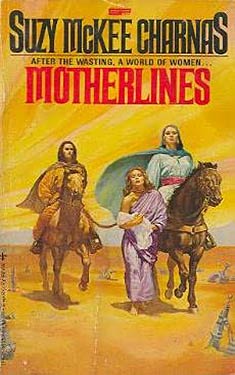Suzy McKee
Charnas
Completed 6/28/2020,
Reviewed 6/28/2020
3 stars
I had heard
better things about this book than the first in the series, Walk to the End of the World. It’s certainly different in
how it’s written and it’s about a women’s dystopia rather than that of
men. But I felt it suffered from several
issues, most notably, a boring plot. It
follows the character Alldera from the first book as she discovers tribes of
women and free fems out beyond the Wild. The world building is pretty great and the
prose is generally decent. However, I just
couldn’t get involved with the characters, much like the first book. Even though Alldera was in the focus of the
book, I couldn’t identify with her.
Nonetheless, this is the second book of the Holdcraft Chronicles which
is in the Gaylactic Spectrum Hall of Fame and a Sideways retro award winner.
 Alldera, the
fem slave from the first book, runs away from Holdfast as it plunges into civil
war. She makes her way through the Wild
searching for the tribe of escaped fems that are purported to be somewhere out
west. She finds herself pregnant by one
of her captors who raped her as she bravely makes her way alone in the
wilderness. She spies monsters, two-headed
four-legged creatures that pursue her.
She discovers they are women on horses.
They bring her back to their tribe to nurse her back to health and help
her deliver her child. She is told the
women are descendants of a group of women who were genetically modified to be
able to bear children without men. But
when Alldera discovers how the pregnancies are activated, she runs off to the
find the free fems. They, however, are quite
dysfunctional, almost recreating the negative, unhealthy environment that they
escaped from. Alldera has no choice but
to try to reconcile the two tribes and try to bring out the best between them.
Alldera, the
fem slave from the first book, runs away from Holdfast as it plunges into civil
war. She makes her way through the Wild
searching for the tribe of escaped fems that are purported to be somewhere out
west. She finds herself pregnant by one
of her captors who raped her as she bravely makes her way alone in the
wilderness. She spies monsters, two-headed
four-legged creatures that pursue her.
She discovers they are women on horses.
They bring her back to their tribe to nurse her back to health and help
her deliver her child. She is told the
women are descendants of a group of women who were genetically modified to be
able to bear children without men. But
when Alldera discovers how the pregnancies are activated, she runs off to the
find the free fems. They, however, are quite
dysfunctional, almost recreating the negative, unhealthy environment that they
escaped from. Alldera has no choice but
to try to reconcile the two tribes and try to bring out the best between them.
One of the
biggest problems with the first book was the exposition. This book doesn’t have quite the same problem. It introduces the two cultures a little more
organically. Only a few times does story
devolve into info dumping. Still, I
could not get immersed in the story. I
could never see where the book wanted to take me until the very end. It was more slice of life rather than a
strongly plotted story.
Another problem
was the characterization. I didn’t care
for any of the characters. Some were
benevolent, some were mean, but they all felt very two-dimensional. And even though the story was told in third
person mostly from the point of view Alldera, I didn’t feel like she was fleshed
out. It seemed she had no emotions, as
if she were disaffected. Granted, she
was on guard through much of the beginning of the book, as you’d expect from
someone who suffered intense abuse and then was put into a somewhat healthier
environment. But she never comes out of
it. She grows attached to some of the
women she has sexual relationships with, but even that didn’t draw me in.
I give the
book three stars out of five. Like the
first book, the world-building was phenomenal.
I thought Charnas’ creation of two dystopias and trying to make a utopia
out of their combination was great. The
prose was also good, with lush descriptions of a harsh plains environment. I just couldn’t care enough about the main
character or any of the other secondary characters. Like Alldera, I almost felt a disassociation with
book. Sticking with it was tough, even
though I had long sessions with it. But,
this is considered a classic of feminist lesbian science fiction, and I’m glad
I read it. However, I’m probably not
going to read the rest of the series, which Charnas finally completed thirty
years after these first two books were published.
No comments:
Post a Comment